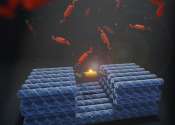Autonomous nanomachines inspired by nature
Inspired by the way molecules interact in nature, UNSW medical researchers engineer versatile nanoscale machines to enable greater functional range.

Inspired by the way molecules interact in nature, UNSW medical researchers engineer versatile nanoscale machines to enable greater functional range.
Bio & Medicine
Mar 23, 2022
0
100

Catheters are of paramount importance for minimally invasive surgery. They enable interventions such as the removal of blood clots, the insertion of implants, or the targeted administration of drugs, and are intended to be ...
Bio & Medicine
Dec 22, 2021
0
11

Quantitative Biosciences Institute (QBI) researchers at UC San Francisco have discovered a new paradigm for how fundamental biological switches, proteins that can be turned on and off to control processes like cell differentiation, ...
Molecular & Computational biology
Oct 14, 2021
0
24

A research team led by Prof. Dr. Michael Sommer, Professorship of Polymer Chemistry at Chemnitz University of Technology, and PD Dr. Michael Walter, project leader at the Cluster Of Excellence Living, Adaptive, and Energy-autonomous ...
Polymers
Aug 4, 2021
0
172

Gears and mechanical transmissions are at home in the Emilia-Romagna region, the Motor Valley of northern Italy. A team of researchers from the University of Bologna and the Institute for Organic Synthesis and Photoreactivity ...
Materials Science
May 17, 2021
1
104

A research group working at Uppsala University has succeeded in studying 'translation factors' – important components of a cell's protein synthesis machinery—that are several billion years old. By studying these ancient ...
Molecular & Computational biology
Apr 29, 2021
0
42

ETH Zurich researchers conducted an experiment to investigate the initial steps in the formation of aerosols. Their findings are now aiding efforts to better understand and model that process—for example, the formation ...
General Physics
Jan 14, 2021
0
24

Rhamnella in the family of Rhamnaceae is a small genus. To date, 10 species have been accepted into this genus. In field investigations, researchers from the Xishuangbanna Tropical Botanical garden (XTBG) found two Rhamnella ...
Plants & Animals
Sep 10, 2020
0
11

Molecules are some of life's most basic building blocks. When they work together in the right way, they become molecular machines that can solve the most amazing tasks. They are essential for all organisms by, for example, ...
Materials Science
May 4, 2020
2
11

The conductivity of Graphene has made it a target for many researchers seeking to exploit it to create molecular scale devices and now a research team jointly led by University of Warwick and EMPA have found a way past a ...
Nanomaterials
Sep 16, 2019
0
444